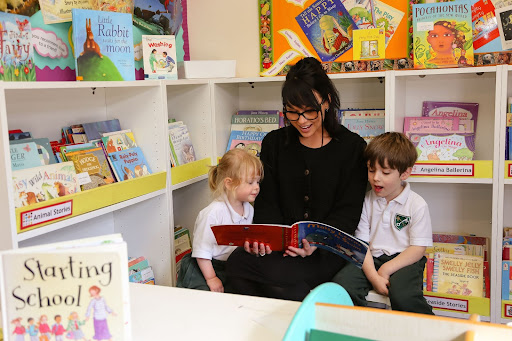We’ve all had to deal with sensitive issues in our lives, but that doesn’t make it any easier when your child starts asking awkward questions that you don’t know how to answer.
St. Peter’s Prep has a vested interest in the mental well-being of our pupils, and we understand how important it is for parents and caretakers to have the necessary tools to best support their children, including the ability to have open conversations.
Some potentially sensitive topics may include:
- Experiencing bullying or being friends with someone who is going through this.
- Exposure to adult topics such as sex, addictive substances, or abusive material (online or in person).
- Delivering some bad news, such as a family death or illness.
- When the issue itself may be unknown but your child is exhibiting unusual behaviours, such as underperforming at school or maybe seeming sadder, anxious, or more irritable than normal.
No matter your child’s age, resolving tense situations is always possible, but it can be difficult to know how exactly to do this.
If you’re worried about how to approach talking to your child, take a look at our advice on how to handle delicate matters in an effective, problem-solving way.
Why You Should Talk About the Tough Stuff With Your Child
There will naturally be times when your child will need emotional support while growing up. You are likely going to have to explain something that has upset your child, but sometimes it might feel easier to avoid this out of fear that you’ll only make the situation worse.
Trying to tackle a topic like mental health, for example, can easily leave you feeling overwhelmed and underprepared. To discover ways to initiate this discussion with your child, take a look at ways to support your child’s mental health to help them to be at their best.
It’s important to remember that talking things through will give your child a sense of catharsis. While this is easier said than done, teaching your child to communicate openly at a young age will lay the foundation for lifelong healthy coping mechanisms and inner strength.
Talking About Something Difficult with Your Child
Whether your child is experiencing something difficult personally, or a friend/family member is, or they need to be made aware of something serious, give your child the confidence to feel that they will not be judged for opening up about their feelings. This is true even if what they have to say is difficult to hear.
Take a look below at a few general steps that can guide you through this difficult process:
Choose Your Moment Carefully
There’s no telling what kind of tricky topics might crop up and some things are best dealt with as soon as possible. But before you take action, take a moment to consider your approach first.
For example, if you decide to talk to your child later during the day, they might be too tired to concentrate or fully comprehend what you’re telling them. Or if they’re playing with siblings or friends, they may feel very self-conscious if you’re engaging them in a serious discussion.
Talk to them in a private place and, if possible, plan the discussion for earlier in the day so that they have time to process anything potentially heavy.
Listen to Your Child
Sometimes your child might be the one to come to you with a concern they have. Whatever the situation, reciprocation is a critical aspect of healthy communication.
Don’t interrupt them; if this is a subject with a lot of gravitas, it is understandable that they might feel anxious or need some time to figure out what they want to say.
Try not to ask them questions that only result in “yes” and “no” answers so that your child has the freedom to think more independently. Encourage them to ask you questions too.
There is a chance that they may not feel ready to open up to you. Try not to take this personally; reassure them that it’s okay to talk to other trusted adults, or direct them to a good resource like Childline if anything is bothering them.
Don’t Become Discouraged
This is probably the most crucial step. Dealing with emotional struggles is like exercising a muscle: the more you use it, the stronger it will become over time.
So don’t be discouraged if, at first, your child doesn’t seem to cope well with crises. Even if it feels like a talk hasn’t resolved the situation, sometimes the best thing you can do is weather the storm.
Ironically, a big part of building emotional resilience is learning how to fail. Although we all want our children to succeed as much as possible, it’s important to acknowledge why failure is important for children as it helps teach them not to let any missteps bring them down.
Be Aware of the Role Social Media Plays

A big sensitive topic for children nowadays is figuring out ways for them to safely navigate social media. As the internet becomes an ever-increasingly integral part of our lives, parents need to develop strategies for dealing with this.
Unrealistic body image expectations, exposure to explicit content, or toxic online chat rooms are things that a child is not emotionally mature enough to fully understand.
They can become very attached to digital devices and may become defensive if they’re taken away; this is why it’s beneficial to nip this issue in the bud as early as possible. Establish boundaries when they are young and gradually allow them more freedom as they get older.
For more information, learn how to ensure a safer internet for children’s mental health so you know how best to protect them in this digital age.
Here at St Peter’s, we are passionate about providing a nurturing, supportive environment for our pupils to flourish but also understand the need to give them space to feel their negative emotions openly and honestly. The most important thing is that pupils feel they can reach out for help.
To enquire about a place at St Peter’s Preparatory School, please contact our Director of Admissions and Marketing, Mrs Rachel Jupp, on 01395 280335 or rachel.jupp@stpetersprepschool.co.uk.









